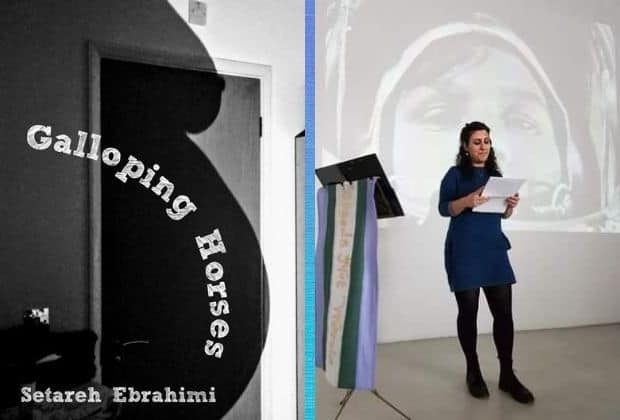
Setareh Ebrahimi is an established poet, and a fine one. Her first full length collection, Galloping Horses, will be launched by Kent based publishers Wordsmithery, at 2pm on August 20, with a Twitter Q&A.
I’ve had the privilege of reading it already, and I thoroughly recommend you do too. It’s a beautiful book, mature, richly layered, cathartic, grounded enough to allow you to identify, ethereal enough to allow you to escape. “There is no poetry in a life that was born/without love” she begins, and love is very much the keynote here – familial love, mother love.
It’s a huge month for Setareh: she’s also moved to Ramsgate with her husband and daughter, attracted by the amazing artistic and cultural life we enjoy here in Thanet, particularly the poetry scene.
“Poets haven’t been priced out here yet”, she explains. “In Thanet a poet can still afford to live, write and gig.”
The breadth of talent here, and the huge range of poetry nights available – pre Covid at least – is testament to that. Poets are like fairies, Luke Wright told us at the Bookie slam, at which Setareh competed: they die without applause.
The sudden cessation of open mic nights has made it more difficult for Setareh to create, and she’s not alone in that. While some writers have relished the unexpected time and solitude, many others have found it alienating. There have been plenty of online poetry events during lockdown, many organised by the endlessly enthusiastic Connor Sansby, but without the physical presence of other poets, the scent of testosterone and terror, the urge to produce has often dwindled.
And for the audience too, seeing poetry on a screen feels somewhat akin to flicking through someone’s holiday snaps: you can see what it looks like, but you can’t feel it. Many other writers have struggled to up their word counts during lockdown, for all the proud boasts of some that they planned to spend their unexpected leisure settling down to unearth their novel. Often writers find that writing needs other people, a snatched conversation, a just-glanced mannerism, a stranger’s bouncing curl, to bring their words to life.
But Galloping Horses has taken two years to come into being. During that time Setareh has become a mother, and motherhood is very much the central theme of this collection, with the cover showing her pregnant silhouette, the title taken from a remark made by the midwife who performed her ultrasound.
“Blessed be” she writes, in solemn salutation to the screaming cries, the pain, the hospital lights, “the body’s ooze”, which accompany childbirth and the early days of motherhood, for “No one told you there would be as much/of everything as there is love,/and you can’t tell anyone.”
She isn’t afraid to tackle the grim, visceral aspects of motherhood, finding as much poetry in the drudgery, the endless chores, the new body that forms around the gaping space a child leaves, as in the transformative love. You are still beautiful, she tells us, and there is magic in the mundane, as well as the sublime.
While her writing evidently allows her to explore some significant personal issues, Setareh explains that its therapeutic impact happens despite her. “It flows from my subconscious when I allow it space and time. If I try to force a poem to be about something in particular, it tends to come out clunky. Usually I’ve no idea what a poem will come to be when it begins.”
She praises her publishers, Wordsmithery, for allowing her to put together the collection in her own way and time, from designing the front cover to the order of her work; and also for the amount of effort they have put into promoting her book, particularly at such a challenging time.
Do keep an eye on this enormously talented writer to discover what she will accomplish next. And do buy Galloping Horses. It will make you happy.

